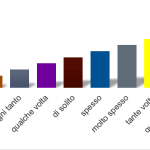Italians are passionate and emotional, and so is our language.
INTERIEZIONI
An interiezione (or esclamazione) is an inviariable part of a sentence (no masculine / feminine, singular / plural) expressing a sudden emotion. It comes from the Latin interiecere, “to throw in the middle”, because it comes suddenly, in the middle of a conversation, usually followed by an exclamation mark.
It is quite difficult to associate a particular emotion with each interiezione, or even translate a single one. I’ll try anyway.
Interiezioni proprie, improprie, locuzioni
Vocabolario
Livello: intermedio
Register for free or Log in
This blog is for members only. Please register for free below.
OR fill the students login form on this page if you already are a member.
Your personal information won’t be shared to third parties, in accordance with our privacy policy.
If you are interested in this topic, you may want to have a look at some Italian “not too bad words”.
I’ll stop here. There are more, of course. Please fee free to book a complimentary Skype class. Ciao.



Riccardo, Grazie per quest’informazione . E molto utile per me come insegnante. Stavo cercando queste parole per informare i miei studenti. Grazie e buona giornata!
Prego.
So Riccardo, are you still on here? I’m an Italian teacher, college level, but currently semi-retired and teaching at a language school, so I’m without the usual crowd of Italians to ask about current usage. If you still use this site, please write back, and I would love to ask you some questions.
Of course I’m here. Please use the language forum “solo italiano”. Since you’re a teacher, I’m expecting you to write your questions in Italian only. Ciao.
Ciao Riccardo when would you use ‘che forte!’ and also ‘figurati’ .Grazie tanto. Lisa
Ciao Lisa,
Che forte can be something like
“how cool!”, Ho visto l’ultimo film con Stallone. Che forte!
“very funny” Che forte Mario, mi fa morire dal ridere.
Figurati is less intuitive. Can be
“you are welcome” A: Grazie mille per il tuo aiuto. B: Figurati. or si figuri (Lei)
“you can imagine = it’s impossible” Il presidente non si dimetterà mai, figurati! or Figuriamoci (noi, tutti)
We can introduce an unlikely event / situation: Figuriamoci se mio marito mi regalerà dei fiori. Non lo fa mai.
Ci sono altre possibilità e sfumature nell’uso di figurati. Ne parleremo. Ciao!
I would make a comment like: The economy will get better. Mamma would say: bocca di angelo. Something like “from the mouths of angels” Instead of “magari” it would be bocca di angelo and I was the “angelo”.Although my reference was usually hope that our political leadership would change. Does that make sense? She really did use it a lot. It might have been a term used more frequently around the Trieste area.
That could be a local version of “parole sante”, very common in standard Italian.
More likely it is similar to the English phrase: “when angels speak”. This insinuates that your statement will practically never happen but you are sweet and innocent (angelic) to think it might.
Interesting. Grazie.
Also my mamma used a term ” bocca di angelo” it was a term she used almost like magari . Have you ever heard the saying?
No, never heard. Interessante. Puoi farmi un esempio? Grazie.
What about “beh” where does that go?
Ciao Marisa. “Beh” è una interiezione propria. Depends on the intonation. Beh…”after all…”;
“Beh!” “not too bad!”;
“Beh?” “do you have anything to say?”.